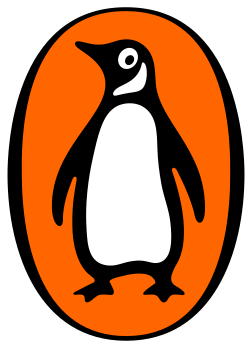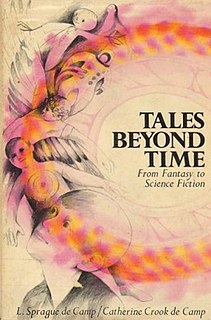
Poul William Anderson was an American science fiction author from the 1940s until the 21st century. Anderson wrote fantasy novels, historical novels, and short stories. His awards include seven Hugo Awards and three Nebula Awards.

Sam Youd, was a British writer, best known for science fiction written under the name of John Christopher, including the novels The Death of Grass, The Possessors, and the young-adult novel series The Tripods. He won the Guardian Children's Fiction Prize in 1971 and the Deutscher Jugendliteraturpreis in 1976.

Dallas McCord "Mack" Reynolds was an American science fiction writer. His pen names included Dallas Ross, Mark Mallory, Clark Collins, Dallas Rose, Guy McCord, Maxine Reynolds, Bob Belmont, and Todd Harding. His work focused on socioeconomic speculation, usually expressed in thought-provoking explorations of utopian societies from a radical, sometime satiric perspective. He was a popular author from the 1950s to the 1970s, especially with readers of science fiction and fantasy magazines.
John Marsden is an Australian writer and school principal. Marsden's books have been translated into eleven languages.
The Tomorrow People is a British children's science fiction television series created by Roger Price. Produced by Thames Television for the ITV Network, the series first ran from 30 April 1973 to 19 February 1979.

Penguin Books is a British publishing house. It was co-founded in 1935 by Sir Allen Lane with his brothers Richard and John, as a line of the publishers The Bodley Head, only becoming a separate company the following year. Penguin revolutionised publishing in the 1930s through its inexpensive paperbacks, sold through Woolworths and other high street stores for sixpence, bringing high-quality fiction and non-fiction to the mass market. Its success showed that large audiences existed for serious books. It also had a significant impact on public debate in Britain through its books on culture, politics, the arts, and science.

The Past Through Tomorrow is a collection of science fiction stories by American writer Robert A. Heinlein, all part of his Future History.
Lewis Padgett was the joint pseudonym of the science fiction authors and spouses Henry Kuttner and C. L. Moore, taken from their mothers' maiden names. They also used the pseudonyms Lawrence O'Donnell and C. H. Liddell, as well as collaborating under their own names.

Viking Press is an American publishing company now owned by Penguin Random House. It was founded in New York City on March 1, 1925, by Harold K. Guinzburg and George S. Oppenheim and then acquired by the Penguin Group in 1975.
The Guardian First Book Award was a literary award presented by The Guardian newspaper. It annually recognised one book by a new writer. It was established in 1999, replacing the Guardian Fiction Award or Guardian Fiction Prize that the newspaper had sponsored from 1965. The Guardian First Book Award was discontinued in 2016, with the 2015 awards being the last.

David Bergen is a Canadian novelist. He has published nine novels and two collections of short stories since 1993 and is currently based in Winnipeg, Manitoba, Canada. His 2005 novel The Time in Between won the Scotiabank Giller Prize and he was a finalist again in 2010 and 2020, making the long list in 2008.

The Tomorrow series is a series of seven young adult invasion novels written by Australian writer John Marsden, detailing the invasion and occupation of Australia by a foreign power. The novels are related from the first-person perspective by Ellie Linton, a teenage girl, who is part of a small band of teenagers waging a guerrilla war on the enemy soldiers in the region around their fictional home town of Wirrawee. The name of the series is derived from the title of the first book, Tomorrow, When the War Began.

Eddie Robson is a British writer and novelist best known for his sitcom Welcome to Our Village, Please Invade Carefully and his work on a variety of spin-offs from the BBC Television series Doctor Who. He has written books, comics, short stories, and for television and theatre, and has worked as a freelance journalist for various science fiction magazines. He is married and lives in Lancaster.

Tommy Tomorrow is a science fiction hero published by DC Comics in several of their titles from 1947 to 1963. He first appeared in Real Fact Comics #6. He was created by Jack Schiff, George Kashdan, Bernie Breslauer, Virgil Finlay, and Howard Sherman. The comic was originally intended to feature non-fiction tales in the style of Ripley's Believe It or Not; Tommy Tomorrow's trip to Mars was presented as a future vision of space travel. The strip was a back-up feature in Action Comics from issue #127 to #147.
Lee John Harding is an Australian freelance photographer, who became a writer of science fiction novels and short stories.

Tales Beyond Time: From Fantasy to Science Fiction is an anthology of fantasy and science fiction short stories, edited by L. Sprague de Camp and Catherine Crook de Camp. It was first published in hardcover by Lothrop Lee & Shepard in 1973, and in paperback by William Morrow; a large print edition followed from G. K. Hall & Co. in 1974. It was the second such anthology assembled by the de Camps, following their earlier 3000 Years of Fantasy and Science Fiction (1972).

Tales of Tomorrow is an American anthology science fiction series that was performed and broadcast live on ABC from 1951 to 1953. The series covered such stories as Frankenstein starring Lon Chaney Jr., 20,000 Leagues Under the Sea starring Thomas Mitchell as Captain Nemo, and many others.

Worlds of Tomorrow was an American science fiction magazine published from 1963 to 1967, at which point it was merged into If. The first issue appeared in April 1963. The last issue was published in May 1967. The publishers were Barmaray Co, New York City, and then Galaxy Publishing. It briefly resumed publication from Summer 1970 to Spring 1971, producing three issue. The magazine was edited by Frederik Pohl in its first period of publication, and by Ejler Jakobsson in the second. It has published fiction by such noted authors as Arthur C. Clarke, Larry Niven, Fritz Leiber, Philip K. Dick, Brian W. Aldiss, Jack Williamson and Philip José Farmer.
The Mike Stuart Span was a British 1960s pop band consisting of Stuart Hobday, Brian Bennett, Roger McCabe, and Gary Murphy (drums). Their critical reputation is based almost exclusively on the merits of a handful of rare or unreleased recordings. In 1969 they briefly changed their name to Leviathan, before splitting up.

"The Stolen Dormouse" is a science fiction novella by American writer L. Sprague de Camp. It was first published as a serial in the magazine Astounding Science-Fiction for April and May, 1941 and first appeared in book form in de Camp's collection Divide and Rule. The story has also appeared in the anthologies Astounding Stories: The 60th Anniversary Collection, and The Best of Astounding: Classic Short Novels from the Golden Age of Science Fiction.














